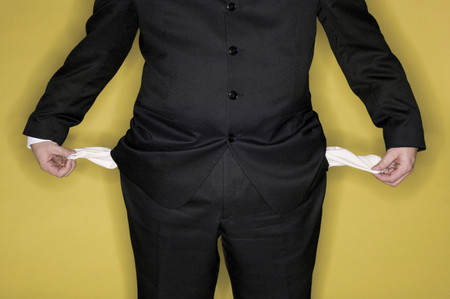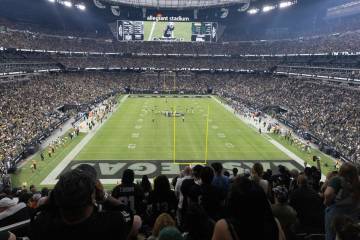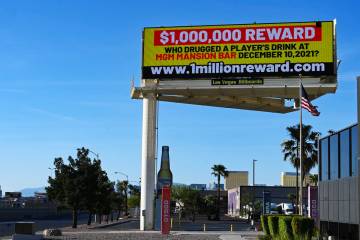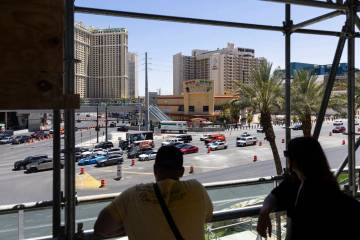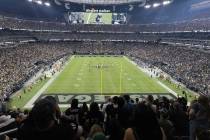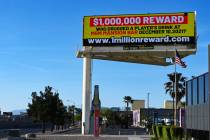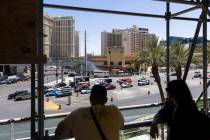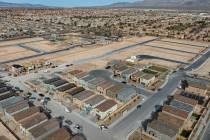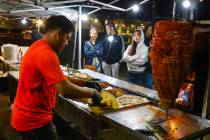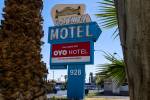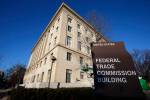Recession continued to grip nation, waging a brutal war on Nevada
If you don't like bad news, stop reading now.
Besides, if you're a regular Review-Journal reader, you've heard everything we're about to tell you.
You already know the national recession that began in December 2007 continued to grip the nation in 2009, waging an especially brutal war on the construction-based and spending-oriented Nevada economy. Making the state's nut on housing and discretionary dollars propelled Nevada to nation-leading growth in the 1990s and early 2000s, but that formula for expansion couldn't withstand the economic storm that's buffeted the country for two years.
You also already know that pretty much every key indicator measuring economic health in Nevada and Las Vegas flatlined in 2009, from visitation to taxable sales to job creation. (Actually, a mere flatlining would have been nice.)
You know that roughly one in five of your neighbors is out of a job or underemployed, and that more than two-thirds of the homes in your neighborhood are probably worth less than the mortgages owed on them.
And you know that talk surrounding the December opening of CityCenter, a construction and hospitality marvel on the Strip, revolved mostly around whether the project could survive today's hard times, and whether it would decimate visitation at existing resorts.
So why would we need to reminisce about 2009's top 10 business stories? Well, to remind ourselves that we own the fortitude it takes to survive some of the hardest times Las Vegas could possibly throw at us, and to assure ourselves that 2010 couldn't possibly be worse.
Could it?
1. ONE UNEASY ECONOMY
You know it's bad when they start comparing your state to Michigan.
But with reports of nearly vacant Las Vegas subdivisions and mass layoffs happening within the state's top economic engine, that's the parallel economists both local and national began drawing in 2009.
Nevada couldn't shake its long-standing status as the country's top market for foreclosures, a trend that proved great for bargain-hunting buyers but brought disaster to legions of households. Experts estimated that up to 70 percent of Nevada mortgages slipped underwater in 2009, as thousands of bank sales pushed housing prices down toward 2000 averages. The slide in values transformed many residents' homes from virtual ATMs fat with equity into money pits they were desperate to shed.
And thanks to an oversupply of both houses and offices, construction continued to languish in 2009. Banks closed, and so did some of the city's most affordable hotel rooms.
But few economic indicators had as broad an impact on the local economy as rising unemployment. Practically nobody foresaw the record joblessness that visited the Silver State. By the time unemployment in Nevada hit 13.3 percent and joblessness in Las Vegas reached 13.9 percent, only -- you guessed it -- Michigan suffered higher job loss.
Even federal-incentive programs couldn't rouse Nevada's economy. Consumers slumbered through "Cash for Clunkers," and an $8,000 tax credit for first-time homebuyers combined with falling real estate prices to gin up home sales, but it couldn't rescue the market from slumping home values.
Nor could a big reprieve from the record oil and gasoline prices of 2008 goose visitor volume, as tourism numbers and gaming wins slid by double digits during parts of 2009.
And if you ask our readers and even some hospitality experts, President Barack Obama didn't help matters much when he said in a Feb. 9 speech that companies receiving bailout money shouldn't take trips to Las Vegas or the Super Bowl at taxpayers' expense. Tourism observers say the comments cost the city tens of thousands of room nights, as big companies canceled scheduled visits for appearance's sake. For a few months there, we couldn't write a story about visitation or employment in Nevada without a flood of comments from readers blaming Obama's remarks for the sliding numbers.
If the rest of us suffered, 2009 proved a great year in Nevada for bankruptcy attorneys, who began sorting out financial entanglements for major local businesses including Station Casinos, the under-construction Fontainebleau on the Strip and Herbst Gaming.
To top it all off, on Dec. 3, we lost Keith Schwer, the University of Nevada, Las Vegas economics professor who helped us understand what it all means. We'll sorely miss Schwer's keen and insightful analysis as we head into yet another year of uncertainty.
-- Jennifer Robison
Las Vegas Review-Journal
2. CASINO BANKRUPTCIES
In March, casino operator and slot machine route giant Herbst Gaming filed a prepackaged Chapter 11 plan of reorganization, covering some $847 million in total debt.
By the end of the year, Herbst wasn't alone in the U.S. Bankruptcy Court.
When Station Casinos filed for Chapter 11 bankruptcy protection in August, covering some $6 billion in debt, it became readily clear the recession had the gaming industry in its grips.
In August 2008, the Cosmopolitan's original developer defaulted on a $760 million loan and Deutsche Bank took over the project. The German bank is now completing the building.
In April, construction stopped on the massive Fontainebleau project on the Strip's north end when the ownership filed for bankruptcy. The development will be auctioned in January and a lowball bid of $145 million has already been tendered by corporate raider Carl Icahn.
The economy in 2009 depleted revenues -- gaming and nongaming -- which hurt cash flows, which in turn kept casino companies from making payments on their large amounts of debt.
Some operators, such as MGM Mirage, Harrah's Entertainment and Las Vegas Sands Corp. (in November 2008), were able to restructure some their long-term debt and stave off any debt covenants violations -- for now.
Herbst and Station weren't so lucky.
Herbst entered bankruptcy with a prepackaged deal that would give bondholders control of the company's 15 casinos. Herbst would retain its 6,800-machine Nevada route operation. In the end, the court ruled the route operation had to go also and the matter must still be examined by gaming regulators in Nevada, Missouri and Iowa.
Meanwhile, Station Casinos has until the end of March to deliver a reorganization plan. Company officials hope to retain all of Station's 18 casinos.
But that may not be possible.
Boyd Gaming Corp., which was rejected after making an offer to buy a large chunk of Station Casinos for $950 million in February, upped the bid to $2.45 billion in cash and assumed debt earlier this month.
-- Howard Stutz
Las Vegas Review-Journal
3. CITYCENTER ARRIVES
CityCenter opened at the end of 2009, but let's just say it wasn't the easiest of journeys for the most expensive privately financed construction project ever built.
In April, construction on CityCenter was just hours from halting.
MGM Mirage and Dubai World, 50-50 joint venture partners in CityCenter since August 2007, were feuding in a Delaware courtroom. Dubai World wanted out of the project, or at least wanted its joint venture agreement recast. More than $200 million in payments to keep the building cranes moving and 7,000 construction workers on the job were due.
MGM Mirage worked out temporary solutions with its board, its banks and its CityCenter partners to keep the project alive. Eventually, a new deal was struck between MGM Mirage and Dubai World and CityCenter was back on track.
But the track was not without its bumps.
CityCenter had a total construction budget of $8.5 billion, well above the initial projected cost of $4 billion announced 61 months ago.
With 18 million square feet of buildings, which included one 4,004-room hotel-casino, three smaller boutique hotels, high-rise residential, and a 500,000-square-foot retail, entertainment and restaurant district on 67 Strip acres, CityCenter's size and scope had never been tried in Las Vegas.
Along the way, six construction workers died and the project was hit with cost overruns, construction changes and delays and scope changes. Completion of one of the boutique hotels was delayed until 2010.
In the middle of construction, the economy collapsed. MGM Mirage suffered its own financial woes and the company's future was tied to CityCenter. The casino operator teetered on the edge of bankruptcy.
"It was my belief that if we could not save CityCenter, we could not save MGM Mirage," company Chairman and Chief Executive Officer Jim Murren said.
Two months before it opened, MGM Mirage told investors that CityCenter was valued at about half of what it cost to build, due in large part to the tanking luxury condominium market.
By December, the openings of the nongaming Vdara hotel, the ultraluxury Mandarin Oriental, the Crystals retail center and the Aria hotel-casino dominated the news coverage locally and nationally.
Questions about the project, however, remain going into 2010. Will CityCenter grow the Las Vegas tourism market and re-stimulate the economy as MGM Mirage executives predict? Only time will tell.
In the midst of CityCenter's opening, both the Hard Rock Hotel and Planet Hollywood Resort opened expansions.
MGM Mirage worked to help close sales of CityCenter's 2,400 residential condominiums by cutting prices 30 percent and bringing in a national mortgage company to assist in the process. Condominium closings will begin in January.
-- Howard Stutz
Las Vegas Review-Journal
4. BROTHER, CAN YOU OFFER A JOB?
We saw a lot of hand-wringing when Nevada's unemployment rate surged to a five-year high of 5.8 percent at the recession's beginning, in December 2007.
But unemployment trends in 2009 made those bad times look positively vibrant. Joblessness in the Silver State surged into the double digits in February and spent much of the year setting records, blowing past the 1982 high of 10.7 percent in May and reaching fresh pinnacles every month through September.
Few predicted how quickly and sharply the state's economy would deteriorate in 2009. Most economists and researchers forecasted peak unemployment of around 11.5 percent by early 2010. But we got far higher, far faster than expected, setting a record of 13.3 percent in September. Las Vegas joblessness hit a high of 13.9 percent in September, coming perilously close to that 15 percent line that late University of Nevada, Las Vegas economist Keith Schwer said marks the transition from recession to depression. At peak joblessness, 191,000 Nevadans were out of work and looking for jobs, and the state was second only to perennial economic loser Michigan in its share of unemployed. And if you include discouraged workers who stopped the job hunt and part-timers who'd prefer full-time work, then roughly one in five Nevadans was out of work.
Official joblessness had retreated by November, dropping to 12.3 percent statewide and 12.1 percent in Las Vegas in November. The number of unemployed fell to 161,400 statewide in the month, and though that was well below peak jobless numbers, it was also well above the 108,900 unemployed residents the state had in November 2008.
A reliance on construction and consumer spending guaranteed Nevada above-average unemployment, observers said.
Before the recession, the building industry and the leisure and hospitality sector contained roughly 40 percent of the state's jobs. The housing bust and tight restrictions on commercial lending decimated the construction business, while rising national unemployment and flagging consumer confidence left travelers with fewer dollars to drop on tourism. Of the 93,600 jobs lost in Las Vegas since peak employment in May 2007, 37,500 positions were in construction and 29,900 posts were in leisure and hospitality.
Only the combined category of education and health services dodged losses, with the sector adding 3 percent to its statewide jobs base year over year in November. Every other major employment segment in the state cut jobs in the period, including information technology (5.5 percent), finance (2.2 percent), professional and business services (7.3 percent), mining (2.4 percent) and government (4.9 percent).
Even the year-end retrenchment in joblessness raised few hurrahs among observers. That's because it came not from job growth, but from labor-force shrinkage, as beleaguered workers either quit seeking jobs or left the state. By November, nearly 35,000 people had abandoned Nevada's job market. Too bad we can't tell you that means more jobs for those left behind.
-- Jennifer Robison
Las Vegas Review-Journal
5. SLIPPING SALES TAX REVENUE
Nevada's lost that buying feeling. Taxable sales, which measure the purchase of tangible goods from Nevada businesses, fell to 2002 levels in 2009, as an enduring national recession continued to beat down consumer activity in the Silver State.
The state's taxable sales began stumbling in 2007, but the drops accelerated significantly in 2009, falling by double digits every month. The declines surpassed 20 percent in some months, including May, June and August, which yielded the worst drops since experts began tracking the data in 1980.
Trends both local and national combined to curb transactions in 2009.
High unemployment -- nearly 14 percent locally and more than 10 percent nationally -- left fewer consumers with discretionary dollars to spare. And with as many as two-thirds of Las Vegans underwater on their mortgage according to some estimates, the home equity that powered spending in better times essentially evaporated. Consumers spent much of 2009 either unable to travel and shop, or too fearful to venture out with open wallets.
But slumping taxable sales don't merely track sluggish consumer confidence. They also presage additional fiscal woes for the state, because revenue collections on sales transactions help finance public services including prisons and schools.
By the time fiscal 2009 ended on June 30, taxable sales in the fiscal year were down 12.7 percent statewide when compared with fiscal 2008, plummeting from $48.2 billion to $42.1 billion. Taxable sales in Clark County were also off 12.7 percent, going from $35.9 billion in fiscal 2008 to $31.4 billion in fiscal 2009.
And July, the first month of fiscal 2010, didn't provide an auspicious start, with year-over-year taxable sales falling 18.8 percent statewide and 20.6 percent in Clark County. That means revenue collections on taxable sales started the new fiscal year $4.6 million below the projections legislators used in drawing up their budget.
Sales dips in select sectors were even worse than average, with fall-offs in construction, furniture retailing, appliance sales and car sales often exceeding 30 percent to 50 percent. Even "Cash for Clunkers," the federal rebate program designed to encourage consumers to trade in older vehicles for new, couldn't help: Nevada's car dealers saw a 16.4 percent drop in sales year over year in August, amid the program's peak.
The news wasn't bad for everybody, though. A few categories -- telecommunications, food-and-beverage stores and performing arts and spectator sports -- managed sales gains.
The Legislature also raised the sales tax 0.35 percent in early 2009, a move that pushed up the sales tax in Clark County to 8.1 percent beginning July 1. But economists say it's too early to tell whether consumers changed their behavior to dodge the higher levy, and they also note that the recession remains the biggest factor affecting Nevada's taxable sales.
-- Jennifer Robison
Las Vegas Review-Journal
6. HOUSING HEADS DOWN
Houses in Las Vegas are sinking like the Titanic.
Roughly two-thirds of local homeowners are underwater, a common term for negative equity or owing a mortgage balance that's more than the home is worth. These are people who probably bought during the housing price run-up that occurred mostly from 2004 to 2006.
Median existing-home prices have dropped about 50 percent from their peak and are down 27.5 percent from a year ago at $125,000 in November, Las Vegas-based SalesTraq reported.
However, the price has stayed around $125,000 since April, an indication that the bottom may be in sight. SalesTraq President Larry Murphy said we'll look back and see that the market started to recover in the second quarter.
Existing-home sales showed significant gains every month of the year. The 43,573 escrow closings through November represent a 57 percent increase from a year ago, SalesTraq reported.
Investors have returned to Las Vegas, creating bidding wars on low-end foreclosures. Roughly 40 percent of sales were cash-only transactions.
Sales volumes were propped up by government actions such as the $8,000 first-time homebuyer tax credit, the bailout of Freddie Mac and Fannie Mae, and mortgage-rate intervention.
The new-home segment continues to struggle. Sales are down 52 percent through November at 4,696 and the median price is down 17 percent at $199,928, Home Builders Research reported. Also, new-home building permits decreased 41 percent to 3,495 for the year to date.
Las Vegas dropped from No. 1 in the nation in foreclosure filings to No. 5 in November, Irvine, Calif.-based RealtyTrac reported. Even with a 33 percent decrease in foreclosure filings for November, Nevada remains tops in the nation with one in every 119 households in foreclosure.
One emerging trend is the rise in short sales, or homes sold for less than the mortgage owed, as a percentage of total home sales in Las Vegas. Short sales, which must be approved by the bank, increased from 8 percent of sales in the first quarter to 16 percent in October, Robin Camacho of Realty One Group reported.
The number of homes available for sale on the Multiple Listing Service declined modestly during the year. The Greater Las Vegas Association of Realtors showed 20,847 homes on the MLS in November, a decrease of 8.4 percent from 22,770 in the same month a year ago. Taking out pending and contingent sales, only 8,385 homes are listed without offers.
-- Hubble Smith
Las Vegas Review-Journal
7. STAY AWAY FROM VEGAS
President Barack Obama inadvertently set off a firestorm in February and damaged a Las Vegas convention business that was already struggling with a poor economy.
The new president, still used to speaking off the cuff, told a town hall meeting in Indiana that companies taking taxpayer bailout money "can't take a trip to Las Vegas or down to the Super Bowl."
What followed next was an outcry of "foul" from politicians, tourism and casino officials, and the general public who depend on the industry for their livelihood.
Critics of the remark said it helped undermine a business sector that brought 22,000 events, $8.5 billion in spending and directly sustained more than 43,000 jobs in 2008.
Convention attendance fell 26 percent the first 10 months of 2009, driven by a bad economy and, in part, Obama's comments.
Late last year and early this year as the economy unraveled, meeting and conference planners were already canceling meetings planned up and down the Strip.
Obama's remark touched off several rounds of competitive umbrage-taking by Las Vegas boosters -- led by Mayor Oscar Goodman, who demanded a presidential apology -- and Obama apologists, who said the president's remark was just prudent policy.
Obama didn't apologize for his comment when he visited Las Vegas in late May, something champions of the area had hoped would happen.
Obama's comment was followed a few months later by letters sent between Sen. Harry Reid, D-Nev., and Rahm Emanuel, Obama's chief of staff, stating Reid had heard federal agencies either explicitly or implicitly telling meeting planners to pick places like Milwaukee or Cleveland over Las Vegas and other destinations that could be seen as resort getaways.
Reid co-sponsored a bill that would make it illegal for government bureaucrats to implement travel policies that would prohibit official travel to specific destinations "perceived to be a resort or vacation destination."
Goodman and Reps. Shelley Berkley and Dina Titus, both D-Nev., also issued statements or wrote to federal officials regarding travel rules.
Wells Fargo, Goldman Sachs and the Federal Bureau of Investigation moved planned meetings out of Las Vegas, often to areas where hotel rooms and airfare are higher.
-- Arnold M. Knightly
Las Vegas Review-Journal
8. NO MORE CONSTRUCTION CRANES
All but a handful of the 60-plus construction cranes that dotted the Las Vegas Valley skyline a couple years ago have disappeared. Some of the remaining cranes have gone limp, like the one at the Wyndham time share near the Rio.
Construction has been halted on several major projects, including the $4 billion Echelon, the $3 billion Fontainebleau, the $350 million ManhattanWest mixed-use condo development and General Growth Properties' 1.6 million-square-foot Summerlin Centre mall.
Once the $8.5 billion CityCenter is completed, Las Vegas is going to be left with a gaping abyss in construction activity. Nothing significant is on the planning board, a respite from two decades of rampant growth.
Commercial real estate development has come to a virtual standstill with retail, office and industrial vacancy rates at 20-year highs. The next wave of foreclosures is coming in the commercial sector, many analysts have predicted.
Constant Tra, associate professor of economics at University of Nevada, Las Vegas, calculated nearly $2 billion in lost construction revenue this year from Echelon, Fontainebleau and St. Regis condo tower at Palazzo. He also estimated $424 million in lost residential construction based on 5,500 excess housing units at $35 a square foot construction cost.
Commercial building permits dropped dramatically this year and commercial building valuation plummeted 70 percent to 90 percent almost every month when compared with the year-ago period, the UNLV Center for Business and Economic Research reported.
A second-quarter report from the Associated General Contractors of America showed that Las Vegas construction employment declined by 19.8 percent, or 18,900 jobs, from the year-ago period. Las Vegas was among the cities with the largest drop in construction employment, tied with Atlanta at No. 307, or 45th-worst, in a survey of 352 metropolitan areas.
Spanish View Towers was the first luxury high-rise condo project to stop construction in 2006. Two other midrise condos -- Vantage Lofts and Mira Villa -- also hit the skids and went into bankruptcy, though Mira Villa resumed construction and is now selling units in the first phase.
-- Hubble Smith
Las Vegas Review-Journal
9. BANKS GO BUST
If it's Friday, regulators will announce the seizure of a financial institution in Nevada.
That would have been a good rule of thumb in 2009 with one exception. The takeover of Community One Federal Credit Union, the first of the Nevada credit unions to get regulatory assistance in a merger, was announced on a Wednesday in August.
During 2009, seven banks and credit unions were closed in Nevada.
The end of Community One as an independent institution set another pattern for credit unions. Regulators were unable to find a merger partner in Nevada and turned to an out-of-state organization, America First Credit Union of Utah.
Clearstar Financial Credit Union of Reno became history a month later and was merged with United Federal Credit Union of Missouri.
Cumorah Credit Union became part of Credit Union 1, a financial institution based in Rantoul, Ill., in October. It was the only assisted merger in Nevada in 2009 involving a credit union with deposits insured by American Share Insurance, a mutual company based in Dublin, Ohio.
EDS Credit Union of Plano, Texas, took over insolvent Ensign Federal Credit Union in November.
The year was also awful for Nevada banks.
Security Savings Bank of Henderson failed in February and was absorbed by Bank of Nevada.
Great Basin Bank of Elko collapsed in April and was merged into Nevada State Bank.
The seizure of $1.5 billion-asset Community Bank of Nevada, the biggest financial failure of the year, showed how bad a bank could become. Community Bank lost so much value that no other institution agreed to buy even its deposits.
The Federal Deposit Insurance Corp. liquidated Community Bank.
Bankers and credit union executives privately expect more of their peers to disappear over the coming year as more loans go bad, wiping out the net worth of more institutions and pushing more into insolvency. They expect fewer banks and credit unions to be locally owned and will be headquartered in the state this time next year.
-- John G. Edwards
Las Vegas Review-Journal
10. BUDGET GOES BYE-BYE
For consumers who prefer the city's upscale side, 2009 was golden. The year started with rooms at Encore going for more than $200 a night, and ended with more than 5,000 luxurious units coming on line at CityCenter. In between, downtown's Four-Diamond Golden Nugget brought 500 new rooms to the market as well.
But properties at the market's lower end provided unsettling reminders that the budget-minded tourists who traditionally made up Las Vegas' bread and butter continue to suffer financially. They also proved that economic conditions can indeed push room rates so low that some properties simply can't sustain enough cash flow to stay in business.
Downtown budget stalwart Binion's closed all of its 365 hotel rooms on Dec. 14, putting 100 members of its 800-employee labor force out of work.
Binion's also closed its Original Coffee Shop and discontinued keno in its casino. The property kept doors open to its casino, sports book, poker room and other casino-floor amenities such as cafes.
And the Sahara closed two of its three hotel towers for the winter, saving only its 1,720-room Tangiers tower for guests in the colder months.
Representatives at both properties blamed the closures on the ailing economy.
TLC Casino Enterprises, which owns Binion's, decided that occupancy and average daily room rates had fallen too much to sustain hotel operations.
Just before the hotel closed, room rates at Binion's ranged from $23 a night midweek to $54 a night on weekends.
"This is a result of this brutal economy that has affected Las Vegas," company spokeswoman Lisa Robinson said. "We looked at every aspect of our operations, and the hotel rooms are no longer competitive in this market."
Binion's and the Sahara weren't the only lower-end properties that struggled in 2009.
The Riviera's revenue declined 28.9 percent in the first nine months of the year, as its room rates fell 20.8 percent. The Stratosphere's revenue slumped 17 percent, while room rates plummeted 31.3 percent. Revenue at Circus Circus dropped 21.9 percent, and room rates slid 32.3 percent. The drops made already-cheap rooms even more affordable, but some properties could have yet to find their bottoms.
-- Jennifer Robison
Las Vegas Review-Journal



